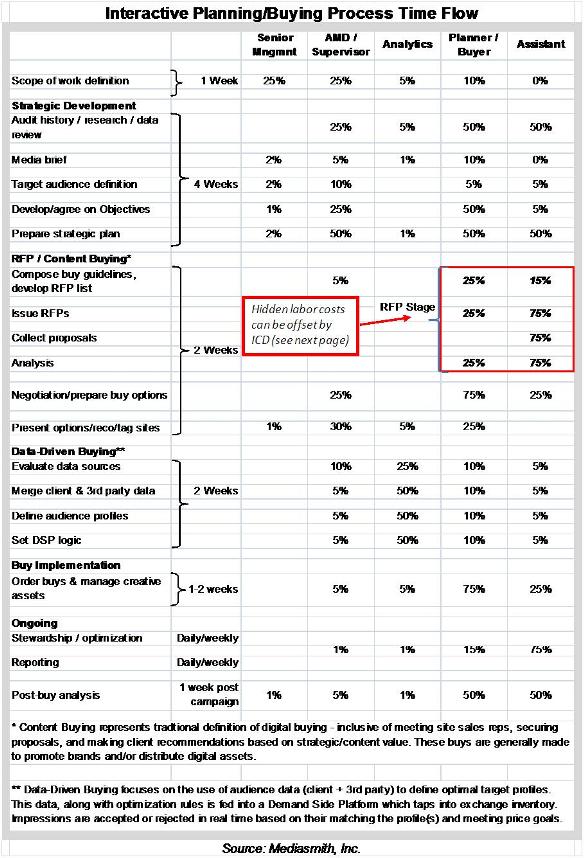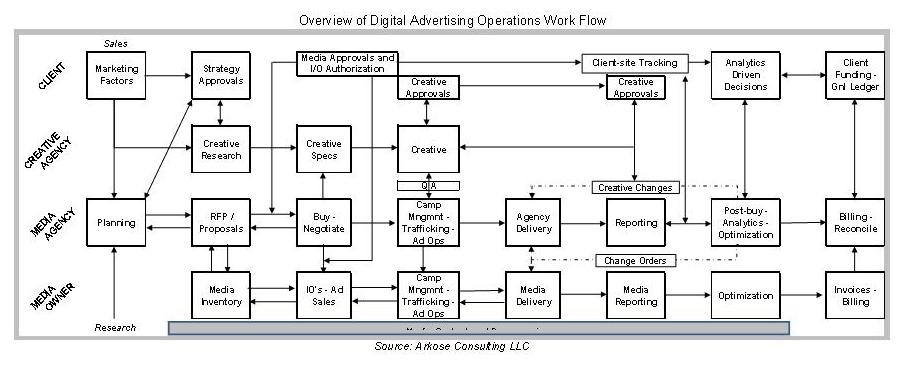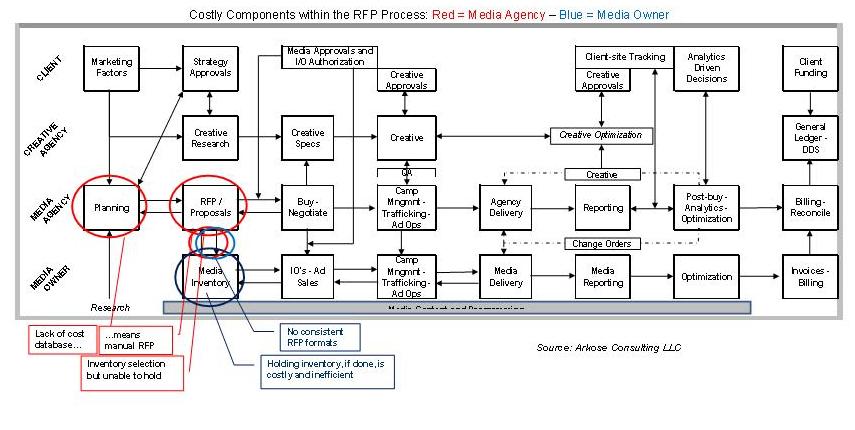Complex Ad Ops-Hidden Cost of RFP- Leo Scullin

I attended the IAB Networks & Exchanges Marketplace this past Monday May 16th in NY. Once again, I was struck by the repeated conversations and panelist proclamations about how complex the digital advertising space is. As the industry tries to get as automated and as algorithm-based as possible, there is still a complex advertising operations system in place that is served by hundreds of point solutions providers, "different-strokes-for-different-folks" approaches at each agency, and no real easy or obvious solutions in sight. In this installment of the Arkose Consulting LLC whitepaper we zero in on the wiring diagram of the ad operations world. Then, with the astute inputs from the Mediasmith team in San Francisco, we demonstrate the hidden costs buried herein, especially regarding the RFP process.
The Ad Operations Work Flow
The digital advertising industry is challenging to manage – no other ad supported industry has "ad operations" at its core – and requires incredibly complex and sophisticated technology to harness all the transactions and hours of labor to manage the operations. Arkose Consulting identified eight key steps or phases supporting the management of digital advertising efforts. The resulting map looks at the interactions of the key constituents – clients, creative agencies, media agencies and media owners – at each phase. This particular map (pictured below) allows one to see the friction as well as the pain points.
Our industry experts all agreed that the outlined work flow from Arkose was largely consistent with theirs, but, as Steve Sullivan, the VP, Digital Supply Chain at the IAB, says, "the ad operations work flow will probably contain the same steps for some time to come, but the way things are done within each phase will evolve." That's good and bad news. What looks smooth and direct on a grid can be very taxing, primarily on campaign management teams at media agencies. As more digital dollars go through this system, and the more optimization is required, the more human labor is required to manage it. It's as if there are no economies of scale. The media owner work flow has been more fortunate in that solution providers have stepped up to address the most pressing issues, like inventory, pricing and yield management and optimization.
Of particular note here is the existence of the RFP stage, a step not associated with other major media, save magazines. In other media, planners and clients have access to cost databases like SRDS in print and SQAD in national and local broadcast. These tools offer directional guidance as to the potential cost and price variations between media vehicles and market segments. In other words, with such a tool price discovery can take place during the planning stage and not at the RFP stage, as it is now in digital. The digital advertising executive today only knows that this step is essential, but it might not need to be the burden that it is.
If agencies had access to better industry data on costs and specs, the man-hours associated with this phase could be lessened and costs reduced. As seen in the secondary tier example, the RFP has a place in certain parts of the buyer/seller relationship, but not having industry planning tools like SRDS or SQAD weakens the role of the planner.
David L. Smith, the Founder and CEO of SFO-based digital media agency, Mediasmith, Inc. helped confirm the work flow and he pinpoints the RFP stage as "indigenous to the digital media space" and one that can involve considerable time and effort. The Mediasmith team breaks down the planning and buying steps into the time and effort required, summarized below.

The Hidden Cost of the RFP Process
Note that the RFP/Content Buying stage stretches over two weeks. The percentages in the boxed area can be used to define the time each stage requires from each management level in the mix. For example, the compose, issue RFPs, collect responses and RFP analysis tasks requires 75% of a planners time, or 26.25 man-hours (over two 35 hour weeks) and 240% of Assistant's time, or 168 man-hours (over two 35 hour weeks). Obviously, the work load is spread over multiple Assistants, but the time and its associated cost are the real issues here. Billing these costs back to clients may be the norm now, but sooner or later the savvy client will want to see better processes at work. The following annotated work flow map highlights the issues associated with the RFP stage, and underscores the hidden costs for both media agencies and media owners:
An industry cost database would immediately address and reduce the costly interactions associated with the RFP process. David Smith, like other veterans of traditional media, sees the digital RFP inefficiencies as a byproduct of a lack of industry cost data. If planners had access to better industry cost tools, more time could be devoted to developing strategy. However, another senior exec from a large holding company suggests that "the RFP process is not just due to a lack of an ICD, but mainly due to the fact that you can't buy the same things twice." Mr. Smith even suggested that without an ICD his teams probably issue at least twice as many RFPs as needed, causing unnecessary time and costs.
According to Adam Cahill, EVP, Co-Media Director at Hill Holliday in Boston, "the RFP process can sometimes be used as a way to outsource media creativity to the publisher." (Many of the experts interviewed from the sales side agree with this assessment.) Further, Adam says that by issuing an average of 20 RFPs for each campaign, it results in 6-8 vehicles to buy. With constant, sometimes monthly planning cycles, this is a lot of work.
Interestingly, many digital media directors we spoke with indicated their teams had little appreciation for industry data as a whole, from cost databases to research. Some even said that the expertise in the industry is so concentrated among a small universe of people, that "everyone knows what everything costs." Of course, this cannot be true but reliance on the memory of a few should be worrisome to brand marketers.
This brings us to the other side of the high cost of the RFP phase – the impact on the media owner. With no consistent RFP formats, as one sell side marketing and ad ops professional says, "you get three kinds of requests: 1) exact spec – doable; 2) exact spec – totally unrealistic, and; 3) fringe ideas, completely outside the core strengths or platform being considered." To boot, way too much time is spent on the third point, as the back and forth just wastes time and effort. Also, as another senior sales executive cites, "the RFP process is challenging because it takes the same effort to respond to a $50K buy as it does a $500K buy."
Such an example is a perfect place to demonstrate the benefits of an industry cost database. If planners can evaluate their smaller budget plans with an ICD, they will not have to seek RFP input until strategies and key tactics are confirmed. This would save the agency man- hours (cost savings), reduce the sales cycles (cost savings) and keep inventory available for legitimate actual business (revenue improvement).
Benjamin Reid is VP at Operative, which offers an ad business management platform connecting buy side and sell side processes and systems. He says it best, "too much time is spent on the tactics of the plan rather than on the goals of the client." He sees the time wasted on exchanging basic information rather than the thoughtful aspects. David Smith concurs, noting, "if we had better industry tools and databases, as media agencies it would allow us to prove our planning capabilities without others in the loop."
Leo Scullin is a Partner at Arkose Consulting LLC of New York, a firm that offers strategic, tactical and management guidance to clients seeking to leverage their interactive marketing investments and initiatives. He has extensive experience in internet professional services, as well as deep expertise in launching and positioning online and traditional media. lscullin@arkoseconsulting.com
Read all Leo's MediaBizBloggers commentaries at Arkose.
Check us out on Facebook at MediaBizBloggers.com
Follow our Twitter updates @MediaBizBlogger
MediaBizBloggers is an open-thought leadership blog platform for media, marketing and advertising professionals, companies and organizations. To contribute, contact Jack@mediadvisorygroup.com. The opinions expressed in MediaBizBloggers.com are not those of Media Advisory Group, its employees or other MediaBizBloggers.com contributors. Media Advisory Group accepts no responsibility for the views of MediaBizBloggers authors.




